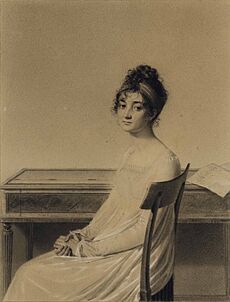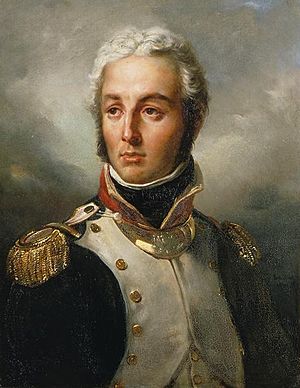Jean Victor Marie Moreau facts for kids
Quick facts for kids
Jean Victor Marie Moreau
|
|
|---|---|
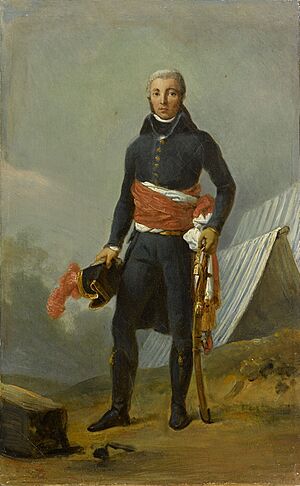
Portrait by François Gérard, c. 1797
|
|
| Born | 14 February 1763 Morlaix, Kingdom of France |
| Died | 2 September 1813 (aged 50) Louny, Austrian Empire |
| Allegiance | |
| Rank | Général de Division Marshal of France (posthumous) |
| Commands held | Army of Italy Army of the Rhine and Moselle |
| Battles/wars | |
| Alma mater | University of Rennes |
| Signature | |
Jean Victor Marie Moreau (French pronunciation: [ʒɑ̃ viktɔʁ maʁi mɔʁo], 14 February 1763 – 2 September 1813) was a French general. He helped Napoleon Bonaparte become powerful. However, he later became Napoleon's main military and political rival. Because of this, he was sent away to the United States. Moreau is known as one of the most important French generals in history.
Contents
Jean Moreau's Early Life
Becoming a General
Moreau was born in Morlaix, a town in Brittany, France. His father was a successful lawyer. He wanted Moreau to study law at the University of Rennes, even though Moreau wanted to join the army.
Young Moreau did not like studying law. He preferred student life and being a leader. He organized his fellow students like a small army and led them. In 1789, he led the students in daily fights in Rennes between young nobles and ordinary people.
In 1791, Moreau was chosen to be a lieutenant colonel for a group of volunteers. He served under General Charles François Dumouriez. In 1793, his battalion was well-organized, and he was known for being a good soldier and believing in a republic. This helped him become a general.
Later, in 1794, Lazare Carnot promoted Moreau to a higher general rank. He was given command of the right side of the army in Flanders.
Moreau's Military Successes
The 1794 Battle of Tourcoing made Moreau famous as a military leader. In 1795, he was given command of the Army of the Rhine and Moselle. With this army, he crossed the Rhine River and moved into Germany.
He was very successful at first, winning several battles and reaching the Isar River. However, he eventually had to retreat when facing Archduke Charles of Austria. Moreau showed great skill in leading this retreat. It was seen as a perfect example of how to pull back an army. He even managed to bring back over 5,000 prisoners. This made his reputation even stronger.
Political Challenges
Dealing with Secret Plans
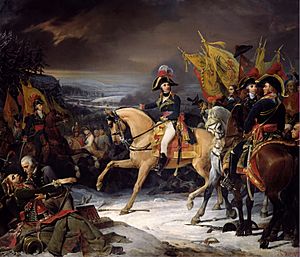
In 1797, Moreau crossed the Rhine again. He faced many problems because he lacked money and supplies. His operations stopped when Bonaparte and the Austrians made a peace agreement called the Peace of Leoben.
Around this time, Moreau found secret letters. These letters showed that his old friend and commander, Charles Pichegru, was secretly working against France with Prince de Condé. Moreau had defended Pichegru before, saying he was loyal. Foolishly, Moreau kept his discovery a secret for too long. This made people suspect he might have been involved.
Too late to clear his name, he sent the letters to Paris. He then told his army that Pichegru was a traitor.
Return to Command
Moreau was removed from his position. He was only brought back in 1799. This happened because Bonaparte was away in Egypt, and the Russian commander Aleksandr Suvorov was winning many battles in Italy. France needed an experienced general.
Moreau commanded the Army of Italy for a short time, but without much success. He was then assigned to the Army of the Rhine. He stayed with Barthelemy Catherine Joubert, who took over his command in Italy, until the Battle of Novi was fought and lost. Joubert died in that battle. Moreau then led the army's retreat to Genoa, where he gave command to Jean Étienne Championnet.
When Bonaparte returned from his campaign in Egypt, he found Moreau in Paris. Moreau was unhappy with the French government at the time. He helped Bonaparte in a major political event called the coup d'état of 18 Brumaire. During this event, Moreau commanded the soldiers who kept two government leaders confined in the Luxembourg Palace.
Problems with Napoleon
As a reward, Napoleon gave Moreau command of the Army of the Rhine again. Moreau pushed the Austrians back from the Rhine to the Isar River. After returning to Paris, he married 19-year-old Eugénie Hulot. She was from Mauritius and a friend of Joséphine de Beauharnais, Napoleon's wife. Eugénie was ambitious and had a strong influence over Moreau.
After spending a few weeks with the army in Germany and winning the famous Battle of Hohenlinden (3 December 1800), Moreau settled down. His wife gathered people who were unhappy with Napoleon's growing power. This group, sometimes called "Club Moreau," annoyed Napoleon. It also encouraged people who wanted the old royal family back. Moreau, however, did not want to bring back the king. He only wanted to restore the republic, perhaps by becoming a military leader himself.
Napoleon knew all about these secret plans. He arrested the people involved. Moreau was found guilty only because Bonaparte put a lot of pressure on the judges. After the judgment, Napoleon pretended to be kind. He changed Moreau's prison sentence to banishment, meaning Moreau had to leave France. In 1804, Moreau traveled through Spain and sailed to America.
Life in Exile
Living in America
Moreau arrived in New York City in August 1805 with his wife. People in the United States welcomed him with excitement. But he refused all offers to serve in the American military. He traveled around the country for some time. In 1806, he settled in Pennsylvania. He bought a house near the Delaware River in Morrisville. This was across the river from Trenton.
He lived there until 1813, spending his time fishing, hunting, and socializing. His home became a safe place for anyone who had been sent away from their own country for political reasons. Representatives from other countries tried to convince him to fight against Napoleon. When the War of 1812 started, President James Madison offered him command of the U.S. troops. Moreau was willing to accept. However, after hearing that Napoleon's army was destroyed in Russia in November 1812, he decided to return to Europe.
Return to Europe and Death
Moreau, likely encouraged by his wife, returned to Europe. He began talking with an old friend from his republican days: Jean-Baptiste Bernadotte. Bernadotte was now Crown prince Charles John of Sweden (who later became King Charles XIV of Sweden).
Charles John, Tsar Alexander I of Russia, the Prussians, and the Austrians were now leading an army against Napoleon. Moreau wanted to see Napoleon defeated and a republic government put back in France. He advised the Swedish and Russian leaders on how best to defeat France.
Moreau was badly wounded in the Battle of Dresden on 27 August 1813. He was talking to Tsar Alexander when he was shot. He died on 2 September in Louny. Earlier, the Tsar had wanted to be the supreme commander of the allied armies, with Moreau as one of his deputies. This idea was strongly resisted by the Austrian Foreign Minister Klemens von Metternich. After Moreau was shot next to him, the Tsar told Metternich, "God has made his judgment. He was of your opinion."
Moreau was buried in the Catholic Church of St. Catherine in St. Petersburg, Russia. His wife received money from the Tsar. Moreau was also given the rank of Marshal of France by Louis XVIII. However, Napoleon's supporters called his actions a "defection," comparing him to other generals who had changed sides.
Moreau's Legacy
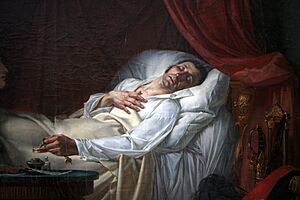
Moreau is highly regarded as a general. His battle plans were clever and detailed, and he remained calm under pressure. Moreau truly believed in a republic, even though his own father was executed during a difficult time in France. His last words, "Soyez tranquilles, messieurs; c'est mon sort," which means "Be calm, gentlemen; this is my fate," suggest he accepted his situation.
The town of Moreau, New York in the United States is named after him.
See also
 In Spanish: Jean Victor Marie Moreau para niños
In Spanish: Jean Victor Marie Moreau para niños


